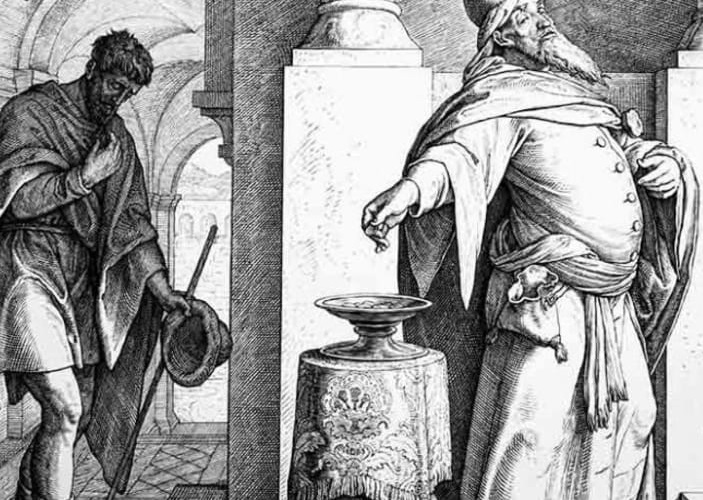30th Sunday C – When We Pray
Two characters appear in the parable today: one a religious Pharisee and the other a sinful tax collector. The gospels usually paint the Pharisees as religious hypocrites and hostile to Jesus, whereas Jesus is seen as the friend of tax collectors and sinners. As we observe the Pharisee at prayer we wonder if he is really praying or merely re-arranging his prejudices. On the other hand you’d wonder what was going on with the tax collector that made him blurt out ‘God, be merciful to me, a sinner.’ What kind of self-knowledge did he have? Francis of Assisi is quoted as saying that the beginning of wisdom is self-knowledge, to know ourselves.
What exactly did the Pharisee do wrong in his prayer? Was it that he took note of the tax collector down in the back seat and considered him with distain? I heard the story of a religion teacher who was explaining this parable to a class of seven year olds. At the end of the class the teacher led the children in a prayer that thanked God they were not like that Pharisee! Unlike the tax collector, the Pharisee was religious in the right ways and said the right prayers, even though he seemingly prayed them to himself and not to God. None of us is immune to the Pharisee’s heart and spirit.
The tax collector’s humble prayer pierced the clouds and reached the heart of God. In his heart he knew who he was, a sinner, and that he had nothing of lasting value to offer. His moral balance sheet showed liabilities only; the assets side was at empty, zero. He was a lifelong sinner and his claim on God was one of out-and-out hope and dependence on his mercy. God’s acceptance of his humble and honest prayer tells us that our own attempts will be blessed as well. He reminds us of ourselves and where we stand before God, ripe and ready to be kidnapped by his mercy.
We are like the Pharisee when we think God’s grace depends on our efforts, feeling we have to earn his love, mercy and forgiveness by our prayers and good works. That attitude makes it practically impossible not to fall into judging others who appear to be less religious. When we do so we place ourselves on the ‘inside’ and keep the others on the ‘outside.’ To be like the tax collector is to have an abiding sense of God’s love and ever-ready mercy for everyone. We are like the tax collector and become less judgmental when we bear in mind that every person has their struggle in life, and that ‘the just man falls seven times a day’.
Fr. QQ – 10/20/2022



